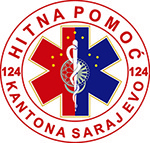EPILEPSY
EPILEPSY
Epilepsy is a term that encompasses a wide range of brain disorders that are manifested by continuous outbursts of brain activity - seizures. Approximately 1 in 10 people can have an attack in their lifetime. This means that this is a common occurrence that anyone can encounter and you may be in a situation where you need to help someone during or after an attack.
How to recognize attacks?
It is crucial to recognize epilepsy. It manifests in different ways, depending on which region of the brain it affects. Signs of an attack depend on the type of attack. Sometimes it is difficult to conclude that this is an attack. A person may look confused, or as if their gaze is focused on something that is not actually there. The other person may fall and have marked cramps and tremors, completely unaware of the situation in which he finds himself.
Most attacks can be classified into two groups:
Generalized seizures affecting both halves of the brain. In this group we include attacks of absence (petit mal) where a person blinks rapidly and looks into an empty space; and tonic-clonic seizures (grand mal) which are too obvious as the person may scream, lose consciousness, pastine the ground followed by cramps and uncontrolled twitching.
Focal seizures that affect small regions of the brain and are therefore called partial seizures. They manifest as changes in the senses, such as the sense of smell or taste. More complex forms of partial attacks are manifested by confusion and lost gaze, during which the person does not answer questions; Attacks can last from a few seconds to a few minutes, but also longer.
What causes seizures?
A seizure can be caused by a number of factors, but that does not mean that every seizure is epilepsy. Dehydration, low blood glucose levels, various disorders of the mineral can primarily cause an attack, but by resolving the cause, the attacks also end. But if the seizures occur independently of some factor, for a long time, then we are talking about epilepsy.
Some known conditions that can cause seizures are:
* cerebrovascular insults "stroke"
* brain tumor
* brain trauma
* infections of the central nervous system
Epilepsy is not contagious and cannot be transmitted from person to person!
How to help a person who has an attack?
Although they look scary, seizures usually do not require urgent medical attention. Call 124 if one of the following items is correct:
the person has never had an attack before
the person has trouble breathing and walking after the attack
attacks last longer than 5 minutes
the attacks go one after the other
a person was injured during the attack
the attack took place in the water
the person is pregnant
What you can do until the ambulance arrives is:
stay calm and composed
be with the person until the attack is over and the person is fully awake. Once the attack is over, the person should be placed somewhere safe to prevent further injuries if the attack recurs. When he regains consciousness completely, communicate what happened in the simplest form.
If a person has epilepsy from before, help them go home safely
if it is the first time, call 124
if a person has generalized tonic-clonic seizures manifested by screaming, falling, cramping, and twitching, stay calm, if possible, alleviate the fall.
Place the person on their side, and if you can, place something soft between their head and the floor.
If the victim is wearing glasses, take them off, and check your immediate surroundings to remove sharp and easily breakable objects. Loosen the collar or tie.
Mjerite trajanje napada. Ukoliko je duže od 5 minuta pozovite 124!
It is equally important to know what not to do.
You may not:
* try to restrain the person
* Put objects in your mouth because a person can hurt their teeth or jaw!
* try to catch their tongue! A person cannot swallow their tongue, but your finger with which you are trying to reach the tongue may be bitten! Protect yourself and others.
* try CPR! Except in cases where the patient has no pulse after the cessation of the attack
* offer food or water if the person is not fully aware
Prevention is not possible in most cases, but a person can avoid a stimulus such as loud music, bright light, sudden color changes. Smoking, alcohol, poor diet, lack of sleep are factors that will contribute to the occurrence of seizures in a person with epilepsy.
It is crucial that the person uses the correct medication.
People with epilepsy have normal lives. They can get married, start a family, have children, do normal jobs. Certain activities were denied to them in order to reduce the possibility of self-harm and injury to other persons. For example, a person with epilepsy cannot drive a car. But if the attacks have not been repeated for a long period of time, this decision can be considered. A person with epilepsy is not allowed to work on a building or operate an airplane. He can't be an astronaut either. But these are just some minimal restrictions. Most people cannot be astronauts. People with epilepsy have the same rights as others. Living with epilepsy is not a nightmare, if you take care of yourself, have self-control and share healthy living habits. If you have epilepsy, tell others that they would not be surprised if the seizure occurs.
